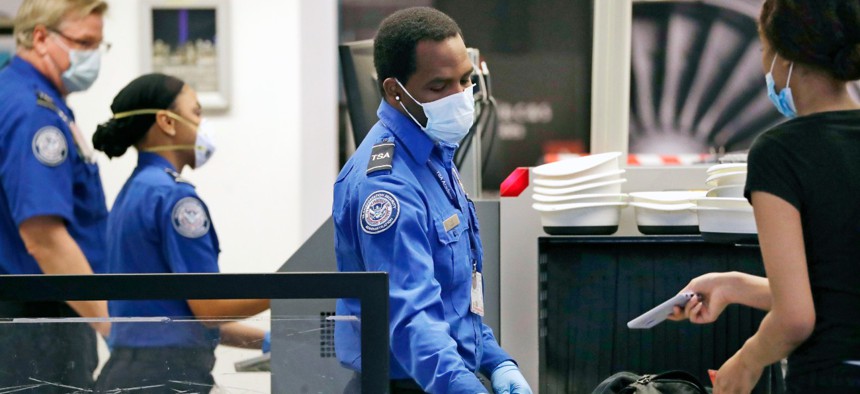
TSA officers wear protective masks at a security screening area at Seattle-Tacoma International Airport in May 2020. Elaine Thompson / AP
Coronavirus Roundup: ‘Federal Workforce Safety’ Added to List of Top Challenges During the Pandemic
There's a lot to keep track of. Here’s today’s list of news updates and stories you may have missed.
The Pandemic Response Accountability Committee, established in the CARES Act, published an updated report on Wednesday about the top challenges the federal government is facing in its pandemic response. The new challenges it identified are: preventing and detecting fraud against government programs, “informing and protecting the public from pandemic-related fraud, data transparency and completeness, [and] federal workforce safety.” The committee published its first report on top challenges last June.
“Many federal agencies have faced challenges implementing reopening procedures,” said the report. “Clear communication with employees and incorporation of guidance from the Centers for Disease Control and Prevention and from the Occupational Safety and Health Administration, coupled with concepts from the Return to Workplace Strategy Book—issued by the General Services Administration in September 2020, and best practices identified by other federal agencies, will help to mitigate risks to employee safety.” The committee said it would assess agencies’ compliance with President Biden’s recent relevant executive orders and memos in its future oversight work. Here are some of the other recent headlines you might have missed.
The Biden administration said on Tuesday that it will begin shipping about 1 million coronavirus vaccine doses per week directly to about 6,500 pharmacies, starting on February 11. These numbers are to start. “Many pharmacies are already administering vaccine doses that have been allocated to states,” Politico noted. “The new pharmacy initiative — which is aimed at broadening access to vaccines generally — is separate from an ongoing federal program to have Walgreens and CVS vaccinate residents of long-term care facilities.”
After previously directing the Federal Emergency Management Agency to reimburse states fully for National Guard and other emergency COVID costs, the administration said on Tuesday it would fully reimburse states for eligible services going back to the start of the pandemic in January 2020. “That means that states will be fully repaid for things like masks, gloves, mobilization of the National Guard, and they can use the additional resources for vaccination efforts and emergency supplies moving forward,” said White House Press Secretary Jen Psaki, during a briefing. “This reimbursement effort is estimated to total three to five billion dollars and is only a small share of the resources that states need to fight this pandemic, which, as we’ve talked about a bit in here before, includes testing, genomic sequencing, and mass vaccination centers.”
The top Pentagon spokesman said on Tuesday that the plan to vaccinate the 40 prisoners at Guantanamo Bay was started under the Trump administration. “The Pentagon first offered the vaccine to health care workers and their support staff, followed by those with critical national security jobs, and then the workforce over 65 years of age or with prior medical conditions,” Politico reported. “Due to its unique population, Guantanamo Bay moved through the phases of the rollout ‘at a faster clip than others,’ [John] Kirby told reporters,” so last Wednesday the department “approved the facility to move to the third phase of vaccinations — the category the detainees fall into.” The Pentagon announced on Saturday that it “paused” this plan, after much backlash.
About 400 National Guard troops deployed to Washington, D.C., for the Inauguration tested positive for coronavirus, which is a higher count than previously reported, The Wall Street Journal reported on Tuesday. None have been hospitalized so far.
On Wednesday, the Council of the Inspectors General on Integrity and Efficiency published its annual report on top management and performance challenges at federal agencies, which include many related to COVID-19. For example, many inspectors general “expressed a concern about the risk of improper payments as a result of COVID-19 relief funding,” said the report. Another is that, “as mass telework continues, agencies are overcoming...challenges, but their pandemic response has highlighted how some of the agencies’ IT services are fragmented or need modernization to perform optimally.”
The Defense Department IG posted on Wednesday its fiscal 2021 first quarter update on its coronavirus oversight work. Some of its ongoing oversight projects include the Armed Forces Retirement Home’s efforts to protect staff and residents, military installations’ public health readiness and DoD components’ maintenance of cybersecurity during telework.
The Justice Department IG reported on Wednesday “opportunities for improvement remain” in the U.S. Marshals Service response to the pandemic. USMS protects the federal judiciary and transports federal prisoners and operates the witness protection program, among other things. “The USMS’s detention facility oversight plan is inconsistent and does not ensure that all active facilities will be assessed for implementation of the latest [CDC] guidance,” said the report. “In addition, the USMS practice of transporting prisoners without first testing to confirm that they are COVID-19 free may lead to further infections and should be re-evaluated.”
CDC Director Dr. Rochelle Walensky said during a briefing on Wednesday it’s “premature” to discuss a possible vaccine mandate for federal property, schools or travel. The Biden coronavirus response team is hopeful that Americans will overcome vaccine skepticism.
Upcoming: White House Press Secretary Jen Psaki will give a briefing at 1:30 p.m.
Help us understand the situation better. Are you a federal employee, contractor or military member with information, concerns, etc. about how your agency is handling the coronavirus? Email us at newstips@govexec.com.







